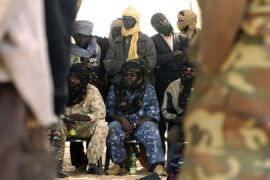Security Council urges Darfur rebels to attend peace talks
October 24, 2007 (UNITED NATIONS) — The UN Security Council on Wednesday pressed all parties in the Darfur conflict to attend upcoming talks in Libya and threatened sanctions against whomever impedes the faltering peace process.
 After UN chief Ban Ki-moon reported on plans for joint UN-African Union (AU) peacekeeping in Darfur, the 15-member body adopted a statement urging all Darfur parties “to attend and to engage fully and constructively in the talks” scheduled to begin in the Libyan resort of Sirte Saturday.
After UN chief Ban Ki-moon reported on plans for joint UN-African Union (AU) peacekeeping in Darfur, the 15-member body adopted a statement urging all Darfur parties “to attend and to engage fully and constructively in the talks” scheduled to begin in the Libyan resort of Sirte Saturday.
The non-binding text also appealed to the parties “as a first step, to urgently agree and implement a cessation of hostilities to be overseen by the United Nations and the African Union.”
The Sirte talks are the latest international effort to end the bloodshed in Darfur.
The council threatened unspecified action, meaning sanctions, “against any party that seeks to undermine the peace process, including by failing to respect such a cessation of hostilities or by impeding the talks, peacekeeping, or humanitarian aid.”
Meanwhile UN envoy Jan Eliasson, who along with his AU counterpart Salim Ahmed Salim is mediating the Sirte talks, pointed to indications that several key Darfur rebel leaders “are not ready to come.”
In a video conference from the Eritrean capital Asmara, he told reporters here that he was urging the recalcitrant Darfur rebel leaders to reconsider, saying they would be given “plenty of time to have consultations among themselves” in Sirte.
“The real negotiation will start only after we have had the full preparation of the parties,” he added.
Wednesday, the Islamist Justice and Equality Movement (JEM) headed by Khalil Ibrahim became the latest rebel group to signal its intention to boycott the meeting.
Six other groups, including hardline Darfur rebel chief Abdel Wahid Mohammed Nur’s faction of the Sudan Liberation Movement, had announced Tuesday they would boycott the talks.
Eliasson said Khalid Ibrahim, however, gave assurances that he would send a representative to the Sirte talks at which Khartoum has pledged to announce a ceasefire.
Only the SLM/A faction of Khamis Abdallah Bakr has said it will attend the Sirte talks, while the SLM-Unity grouping has yet to announce a clear position.
The council also expressed “deep concern at the delays in deploying UNAMID (the UN-AU peacekeeping force)” and urged UN member states “to urgently make available the aviation and ground transport units still required for UNAMID and for all parties in Darfur to facilitate and expedite UNAMID’s effective deployment.”
The UN and the AU have so far agreed to accept troops for UNAMID from at least 16 countries, mostly from Africa but also from Thailand, Bangladesh, Jordan, Nepal, the Netherlands and Scandinavian countries.
But Khartoum has yet to consent to the dispatch of some of the non-African troops, including those from Nepal and Scandinavia.
UNAMID still lacks 24 transport and tactical helicopters and related personnel that are meant to give it sufficient mobility and firepower at a time when Sudanese government troops and rebel fighters are locked in a fresh round of fighting.
The bulk of the force, which is to comprise more than 19,000 military personnel, over 6,000 police and over 5,500 civilians, is not expected to be on the ground in Darfur, a region the size of France, until well into next year.
The council also voiced “strong concern at the continuing deterioration in the security and humanitarian situation in Darfur and urges all parties to exercise restraint immediately, avoiding retaliation and escalation.”
More than two million people have fled their homes and at least 200,000 have died in Darfur from the combined effects of famine and conflict since Khartoum enlisted militia allies to put down a revolt in 2003, according to the UN.
(AFP)
